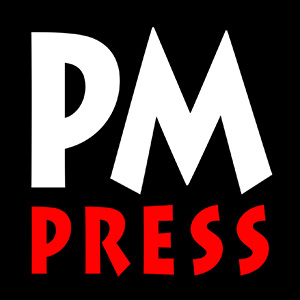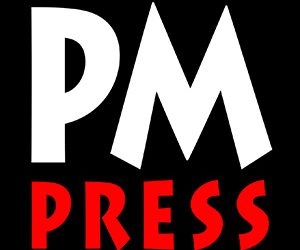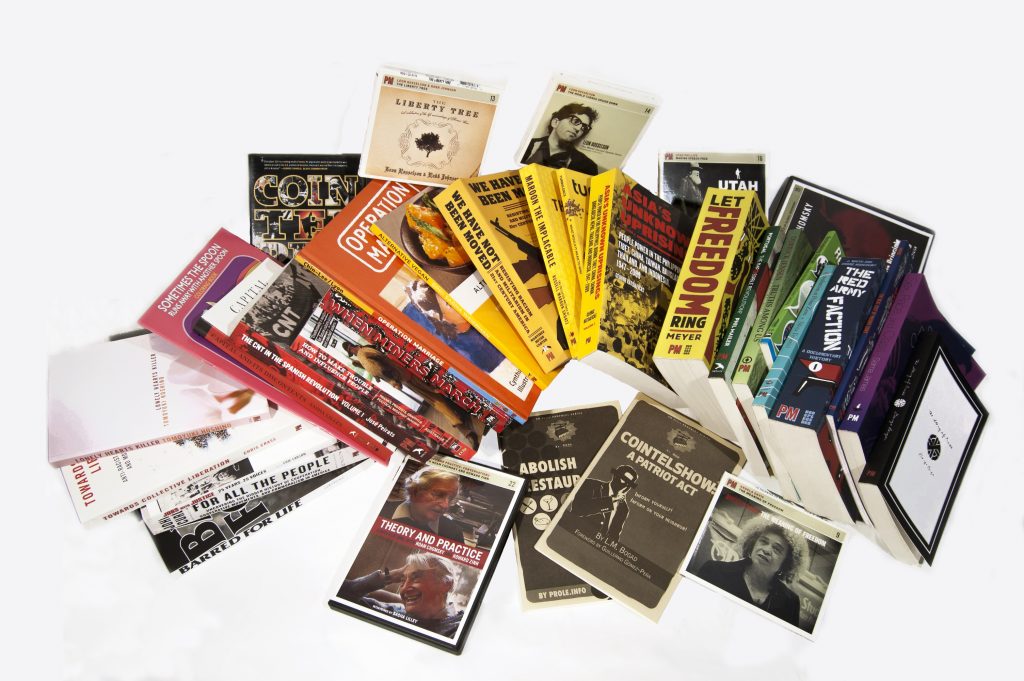
By Rick Kleffel
KQED Arts
July 30th, 2014
It’s no secret that the publishing world is being wrenched apart by forces well beyond its control. Between the ever-shrinking attention span of the average American and the arrival of an entire generation brought up on digital storytelling in video games, on the web and T.V., the book as a means of entertainment seems rather quaint, almost an affectation.
But make no mistake, says Ramsey Kanaan of PM Press, books and reading are still the most potent means of transmitting ideas, and he’s got a warehouse in Oakland full of books to prove it.
Once the province of blue chip corporations headquartered in New York, publishing books is perhaps now best practiced by those with a passion for print. These are the men and women of the independent publishing world, and PM Press, with three home offices and a warehouse in Oakland is a great example.
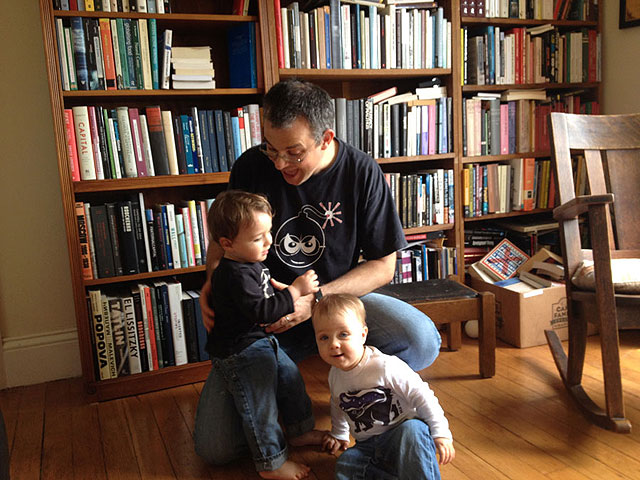
Founder Ramsey Kanaan created PM Press in early 2008, out of the ashes of AK Press, which he’d founded in Scotland in the 1980s. Even before that, as a teenager in the late ’70s, Kanaan was distributing literature. He came to the U.S., and eventually to Oakland, touring with his punk band Political Asylum. Between the burritos and the weather, he was easily seduced and relocated to the Bay Area.
I sat down to talk with him in his home office in Oakland, where he works while his twins learn to walk, talk, and eventually to read. PM Press, he says, “grew up out of my love of literature and my love of ideas.” The babies babble in the background. “How do we transmit ideas? How do we disseminate ideas? I guess that’s what I’ve been driven to do, for better or for worse. I’ve been doing it for the last thirty-plus years.”
Kanaan’s home office offers up stark contrasts. Much of the house is pristine, beautiful and quite decidedly baby-proofed. It’s nothing like you’d expect from the publishing world, beyond the stuffed shelves of books. His office, on the other hand, safely separated by baby-gates, is a torrent of packages, papers, computers, cards, and envelopes. If it looks like a crisis-zone, that’s just a reflection of the business he’s in. “For every decade that I’ve been involved in publishing and the distribution of ideas, they’ve been lurching from one crisis to another.”
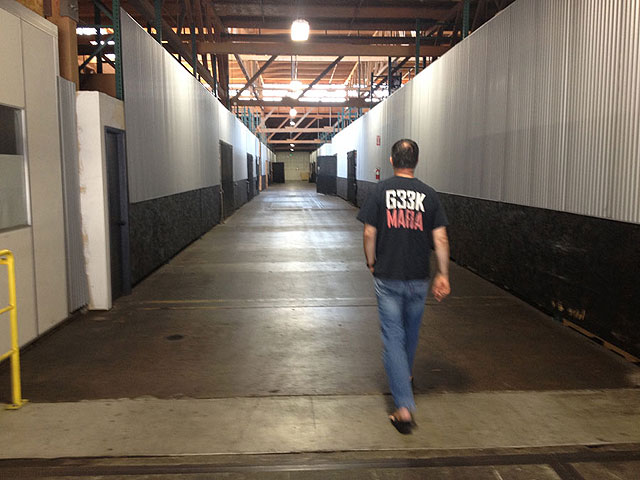
The covers of the books give a pretty clear idea what PM Press is about. “I think PM Press is undoubtedly, explicitly and avowedly left-wing, or progressive, we might say. We certainly draw on various radical, even revolutionary currents of political thought, I guess… That would be, you know, Marxism, anarchism, so we’re definitely radical in that sense. But equally, I would like to think that we have an emphasis on quality, on actually doing good books.”
A visit to the publisher’s warehouse in the industrial wilds of Oakland bears this out. Hidden on a half-street, half-alley behind a mildly blighted strip mall stands a blank-faced concrete building, punctuated by docks and doors. In the dazzling grey sunlight of early afternoon, we drive up and open a door that leads into a long, steel corridor, itself punctuated by more doors. Two turns, is it? And we find Dan Fedorenko and Steven Stothard, Ramsey’s partners in print-crime, holed up in a space that leaves little room for movement and much for books, each chock-a-block with ideas more dangerous than any weapon.
“While the politics or the art or the literature are the criteria, we definitely strive to make good books.” Kanaan’s quite proud of all their latest, from the wild and wooly World War 3 Illustrated, edited by Peter Kuger and Seth Tobocman to Marge Piercy’s The Cost of Lunch, etc. The former is a huge collection of art and stories from World War 3, a magazine, founded in 1979, dedicated to “the ongoing wars being waged around the world, on our doorsteps, or sometimes in our minds,” the back cover explains. The book is 312 slick, smart pages of four-color confrontation.
Marge Piercy comes to the same place from the opposite direction. Delicate and indelibly intelligent, Piercy’s collection of stories examines the lives of everyday women from the inside. It may be more demure in aspect, but it is no less revolutionary in its intent. Piercy and her publisher both want to share ideas that we’ve not encountered elsewhere in the intimate medium of print.
“There are seven paid people at PM Press,” Kanaan says, “and a host of other people — unpaid — donating their time.” In these days of self-published novels and block-busting best-sellers, Kanaan sees his role as, “basically curatorial. How do you A, find the good stuff, and then B, make it better.”
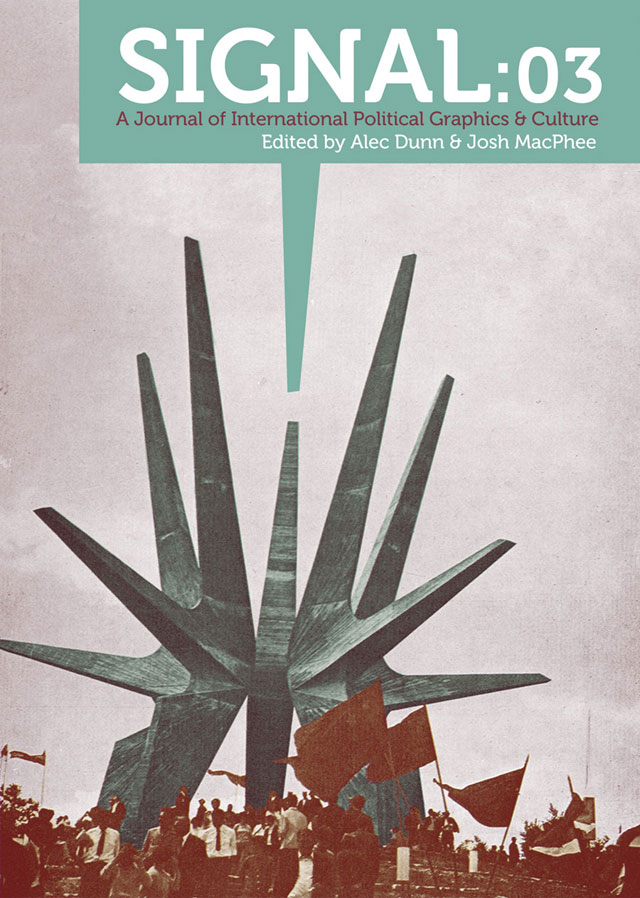
PM Press is clearly doing a great job of both. For all their claims to radicalism, their definition of the term covers a wide territory. Yes, they publish Signal, “a journal of international political graphics and culture.” But they also publish the Outspoken Authors series, featuring “today’s edgiest fiction writers [showcasing] their most provocative and politically challenging stories.” The small booklets include a longish short story (or more) by the likes of Ursula K. Leguin, Karen Joy Fowler, Michael Moorcock and Rudy Rucker, alongside an in-depth interview conducted by renowned author Terry Bisson, the series editor. There’s also a new line of noir and hard-to-find reprints of work by Piercy and Moorcock.
PM Press is in many ways a perfect portrait of a left-coast publisher. They’re running under the radar and pulling a profit in a world where publishing is increasingly a non-profit enterprise. They’re passionate about art, politics and quality. Ultimately, Kanaan allows that, “What has killed publishing and engendered the crisis in the book trade is not changing formats, the effects of which are highly exaggerated, but that fundamentally, people no longer read.”
Hearing this from a man who is standing in a room full of books, with two warehouse rooms holding even more, is to confront the strange reality of our time. No matter how far the technology advances, books are a means of transferring complex ideas in a manner that is more efficient than any invented since.
And PM Press is proof that small, localized publishers, so common here in the Bay Area, can have an influence felt beyond the borders of this or any nation.

